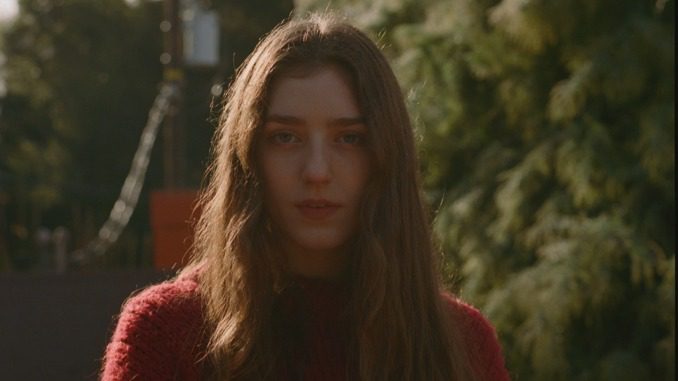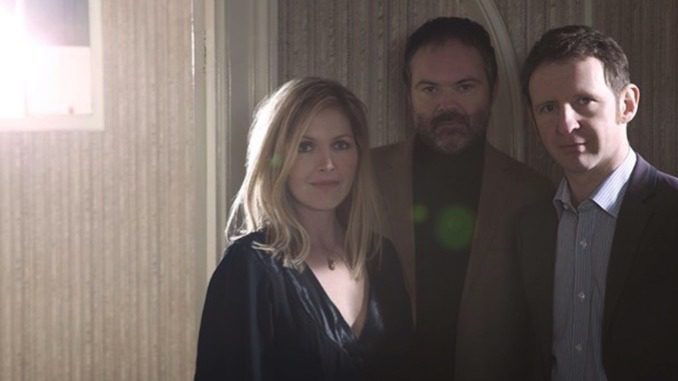Some folks, during the dark lockdown days of the pandemic, learned a lot from looking inward, taking the alone time to get lost in character-building self-reflection. But warbling singer/songwriter Birdy found the inspiration for her new album Young Heart outdoors, on her family’s ancestral grounds in rural England, and in—both ironically and aptly—an actual abandoned duckling she rescued, then raised, last summer. She named her Petrie, after the lovable baby pterodactyl in the animated The Land Before Time film she’d adored as a child, then raised the barely fledged stray like it was one of her own brood.
What life lessons can waterfowl impart? Quite a lot, as it turns out. Birdy—a less-unwieldy sobriquet than the one on her birth certificate, Jasmine Lucilla Elizabeth Jennifer van den Bogaerde (her great uncle was the distinguished actor Sir Dirk Bogarde)—was given the week-old hatchling after it had fallen into a friend’s pool; they thought she might be able to rehabilitate it, given her estate’s access to several nearby lakes. She searched the grounds for a suitable mama duck, to no avail. “So I ended up raising her myself, and she used to sleep in my bedroom, and she would literally sleep on my chest,” she chuckles. “She used to chase after me, and I even taught her to fly.” She pauses to correct that odd image. “Well, I couldn’t show her how to myself, but she started flying, and she would actually come flying in when I called. And then one day she just went back to the wild. It was quite amazing.”
The experience echoes the innocent, childlike wonder coursing through Young Heart, Birdy’s fourth effort. “If I could reach the Northern Lights / Maybe I could understand it all,” the keyboardist muses in her honeyed, throaty trill on the pliant ballad “Surrender,” which sets the somnolent, nature-reverent pace for the proceedings, “Evergreen,” “Lighthouse,” “New Moon,” “River Song” and “Celestial Dancers.” The moment she stops marveling at her verdant environment, or looking at the heavens in awe, she comes crashing back to Earth again in the anguished “Loneliness,” “Secondhand News” (“These days I’m self-destructing,” she mourns therein), and a gospel-soulful “Deepest Lonely,” in which she directly addresses her inner sadness with “When there’s dark clouds overhead / It’s me and you again.”
So first thing’s first, Birdy explains, building her case from square one. Yes, underneath it all, this is definitely something of a breakup album, she admits. And although she still loved her ex, she instinctively knew it was time to let them go and fly solo herself, just like Petrie. Shaking her codependent tendencies was difficult, and it made Young Heart her most difficult undertaking to date (her self-titled 2011 debut was comprised of less-taxing covers, a la the track that first got her noticed, her angelic take on Bon Iver’s “Skinny Love”). “But I just felt like I was at a bit of a crossroads—I was compelled to try new things and to be on my own, and I just felt like it was the right thing to do,” she says.
It’s not like the pianist feared change. At age 12, while still at prep school, she won Britain’s Open Mic U.K. contest, over 10,000 other entrants, and performed her original “So Be Free” before a crowd of 2,000. So this time around, she pushed the envelope, writing and recording in Los Angeles and mainly Nashville, where she settled into a nice, empathetic groove with keen-eared songwriter Daniel Tashian, whose father Barry Tashian once anchored the ‘60s rock band The Remains, who actually opened for The Beatles on their first American tour. The jazzy “Celestial Dancers” was composed with the assistance of James Ford and Foy Vance, and Ethan Johns—son of legendary rock producer Glyn Johns—chipped in on the title track.
What did she derive from the sessions, all told? “Because I was on my own, I had to learn to stick to my guns, and to make all those decisions on my own, which wasn’t easy,” she says. “So I had to really believe in the record, which was unlike anything I’ve ever done before, and that was hard to do for the very first time. I didn’t have anyone to fall back on, so I’ve really learned from that.” Is Birdy nesting with anyone new? She laughs. “No, not at the moment,” she declares. “This whole record is about me needing to be by myself, so I think I’m just going to experience that for awhile.”
“So I definitely love nature, because that’s what I grew up around, and I think if I’m in a city for too long, I start to feel quite claustrophobic,” says Birdy. “I just love being outside, and when I can go home, I’m just outside, most of the day. But this record is inspired more by an American landscape, just from being in L.A., which is so vast and so different from somewhere like London—it made me feel very small in this huge city.” She hit Nashville in summer, she adds, and it felt conversely serene and bucolic. “We were out in the countryside in a little studio,” she says. “And all the cicadas were singing, and we’d just sit on the porch and write.” She sighs at the recollection. “It was just so nice.”
Birdy doesn’t own a telescope, but — as Young Heart implies, she always finds herself compulsively scanning the skies at night. She can view them quite clearly from her grandfather’s home, where she’s been sheltering in place in a little millhouse/cottage for most of lockdown. Ironically, she’d just purchased her first flat in London just as the coronavirus hit, so it’s still sitting there, empty, bereft of furniture and waiting. “I like having somewhere in London that I can go to, that’s my own space,” says the lone wolf, who turns 25 May 15.
In the thick forest surrounding the estate lives a veritable cavalcade of formidable fauna—deer, foxes, badgers, cows, donkeys, and even a herd of wild horses roam freely there. But not all the birdies were as pals-y as Petrie, she cautions. “We had a pheasant that went kind of crazy near where I live,” she says. “And every time we would drive past, it would chase us, and it would actually fly against the car window, and then fly alongside the car trying to run us down. I dunno—I think animals went a bit mad during lockdown, as well.”
But make no mistake—Birdy is no naif. She can add up her Darwinian equations to arrive at a logical survival-of-the fittest sum: Local predators like foxes and badgers plus one relatively tame, friendly duck named Petrie might have added up to tragedy one night. “I know, I know,” she shivers. “But I don’t like to think about that. So I hope she’s still out there somewhere, and living with her own kind now.”




